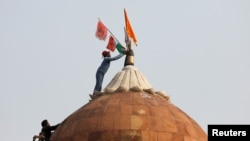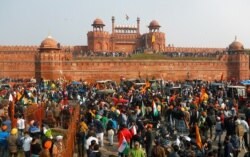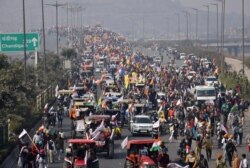A two-month long protest by Indian farmers erupted into chaos as thousands of demonstrators breached the iconic Red Fort complex after breaking police barricades and swarming into the heart of the Indian capital on a convoy of tractors.
Police fired tear gas shells, water cannons and used batons to disperse groups of protesters who diverted from the routes along which they had been allowed to hold a unique rally, riding on thousands of tractors to mark their opposition to three contentious farm laws.
One group of farmers clambered onto the ramparts of the Red Fort from where the prime minister traditionally delivers his annual Independence Day address. They waved flags of farm unions and religious flags, even hoisting a farm union flag alongside the national flag on one the historic buildings.
Others marched into central New Delhi where many government buildings are housed, tearing through police barricades, waving sticks and shouting slogans against Prime Minister Narendra Modi.
At least one protester died and several police personnel were injured in the mayhem that unfolded in New Delhi on Republic Day, which features a military parade to mark the anniversary of India adopting its constitution. The mayhem unfolded after the parade.
Police said the protester died when the tractor in which he was riding overturned. Buses and police vehicles were damaged by protesters hurling stones.
Tens of thousands of angry farmers have been camped on Delhi’s borders since late November, demanding the rollback of the three laws the government says will bring much-needed reform into the agricultural sector, but which farmers fear actually will hurt their livelihoods.
Sleeping in tractors, trucks and makeshift tents, and cooking on the roadside, they have turned highways leading into the city into gigantic protest sites and vowed not to return until their demands are met for scrapping the laws.
The farmers have not been allowed to enter New Delhi so far, but police permitted them to drive thousands of tractors along the city’s outskirts after union leaders gave assurances the rally would be peaceful.
Farm leaders said the protesters who had breached the police barricades, did not represent the majority.
But some farmers broke through police barricades and began marching into New Delhi. At some places, police were outnumbered by protestors who tore down roadblocks and did not respond to leaders who appealed to them to return.
“We will win the battle only if we remain peaceful,” Yogendra Yadav, a farm leader said in an appeal. “The world has watched our peaceful protests. We will fail if we don’t maintain peace.”
“None of the leaders disappeared. They are following the set routes,” protest organizer Samyukt Kisan Morcha said in a statement.
The head of the Bharatiya Kisan Union, Bhanu Pratap Singh, which is spearheading the protest, told reporters that “anti-social” elements had infiltrated the protests.
Several rounds of negotiations between the government and the farmers have failed to resolve the deadlock. Last week, union leaders turned down the government’s latest offer to put the laws on hold for up to 18 months.
The farmers say laws aimed at opening up the sale of agriculture produce to private companies actually will hurt their incomes and strip away the safeguard provided by the government, which buys food grains such as rice and wheat at what is called a “minimum support price.”
The government says the new laws will bring private investment into the farm sector and help to modernize it.
Opposition leaders have blamed the government for passing the laws hastily without adequate consultation, either with political parties or farmers representatives.
Analysts say the protest highlights the growing frustration among farmers. Nearly half the country’s 1.3 billion people depend on farming, but agriculture accounts for just 15 percent of India’s gross domestic product.
“Today’s happenings are a very unfortunate development, but it also shows a lack of sensitivity on the side of the government in handling an issue on which a very large section of India is feeling very aggrieved,” says political analyst Nilanjan Mukhopadhyay.








